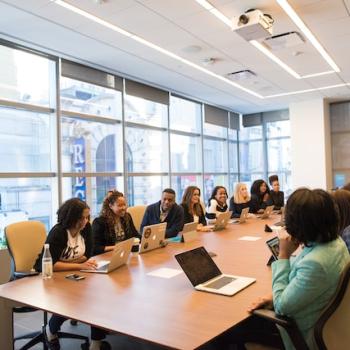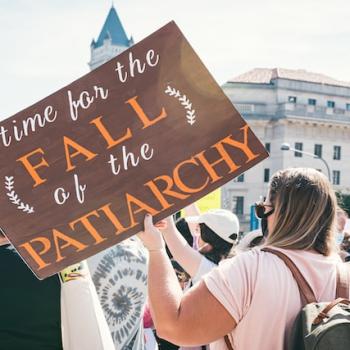
I enjoyed the Barbie movie. I mean, anytime a woman goes on a legit hero’s journey, I’m here for it. (This is still uncommon enough that it freaks some men out.) But as much as I loved the smart, powerful women and the musical-style dance numbers, I also left the theater thinking: Deprogramming from patriarchy is not that easy.
(Warning: this post contains spoilers!)
The Monologue That Magically Deprograms All Women
For those who haven’t yet seen Barbie, or who want a refresher on some of the things America Ferrera’s character says, here’s part of her speech:
It is literally impossible to be a woman…Like, we have to always be extraordinary, but somehow we’re always doing it wrong.
You have to be thin, but not too thin…You have to have money, but you can’t ask for money because that’s crass. You have to be a boss, but you can’t be mean. You have to lead, but you can’t squash other people’s ideas. You’re supposed to love being a mother, but don’t talk about your kids all the damn time. You have to be a career woman but also always be looking out for other people. You have to answer for men’s bad behavior, which is insane, but if you point that out, you’re accused of complaining.
She goes on. But you get the idea. It’s absolutely on point. In different ways, I think most women (at least in dominant U.S. American society) feel this.
In the movie, as Ferrera names these impossible conflicting expectations placed on women, all the different Barbies suddenly snap out of their state of temporary brainwashing where they thought they were happy to be subservient to the Kens.
That’s it. All deprogrammed. They see the inadequacy of patriarchy. And in that moment they are suddenly freed from its power.
Wouldn’t it be nice if things worked this way in our world, too?
But, in my experience, deprogramming from patriarchy is not that easy.
Naming the Problems
Certainly there is power in putting words to the impact patriarchal gender roles have on women.
When we better understand why exactly we feel insecure, or inadequate, or self-conscious, or not good enough—or, as Barbie puts it during her stint in the real world, “I’m conscious, but it’s myself that I’m conscious of”—we are beginning to gain the tools we need to push back.
We are beginning to gain tools to understand ourselves and our world differently. To embrace our agency to define who we want to be rather than contorting ourselves to fit a particular set of gendered norms. To disrupt the power balance of patriarchy.
But it’s a long road.
This is a first step toward deprogramming from patriarchy. But there is still a long way to go. Just because we are aware of these things doesn’t mean that they will change.
Deprogramming Women Is Not Enough
I know I’m not the only one with some deeply internalized sexism. I’m not the only one who knows in theory that the unique way in which I am a woman is a wonderful way, regardless of where it does or doesn’t fit cultural notions of femininity. But it still doesn’t always feel wonderful.
Even if we as women are liberated to know our worth, that doesn’t automatically change our world. Even if every single woman instantly becomes her freest, most powerful, most confident self, if the patriarchal systems we live within don’t change, we are not really free. We will continue to be punished for our unladylike confidence, for our authentic expression of the fullness of our humanity.
If our world does not change such that women’s lives are truly valued and women’s authority over our own lives is honored, there is only so far individual women’s self-confidence can take us.
And that is not liberation.
Where Do We Go From Here?
Deprogramming from patriarchy is not easy. It requires not just individual change, but systems change. It calls for changed mindsets, worldviews, theologies. Changed relationships, communities, power structures.
These changes go deep.
I draw on bell hooks’ vision for this:
“Imagine living in a world where there is no domination, where females and males are not alike or even always equal, but where a vision of mutuality is the ethos shaping our interaction. Imagine living in a world where we can all be who we are, a world of peace and possibility. Feminist revolution alone will not create such a world; we need to end racism, class elitism, imperialism. But it will make it possible for us to be fully self-actualized females and males able to create beloved community, to live together, realizing our dreams of freedom and justice, living the truth that we are all ‘created equal’” (Feminism Is for Everybody, x).
Amen to that. We are aiming for more than just women snapping out of the patriarchal brainwashing that makes us think we’re less than, that we belong on the sidelines and in the margins.
We’re aiming for a world, as bell hooks writes, of no domination. Of mutuality. Of peace and possibility. Holistically. Not just along gendered lines, but also race and class and nationality.
We’re aiming for beloved community. For freedom and justice. For equality.
Individuals’ deprogramming from the often-devastating impact of patriarchy is a first step. It is monumental. It is not easy.
But it is also, on its own, not enough. I liked the Barbie movie. But I think we can dream bigger dreams, together.
















